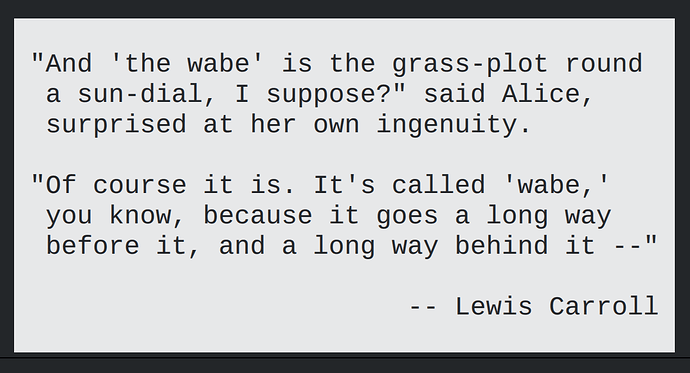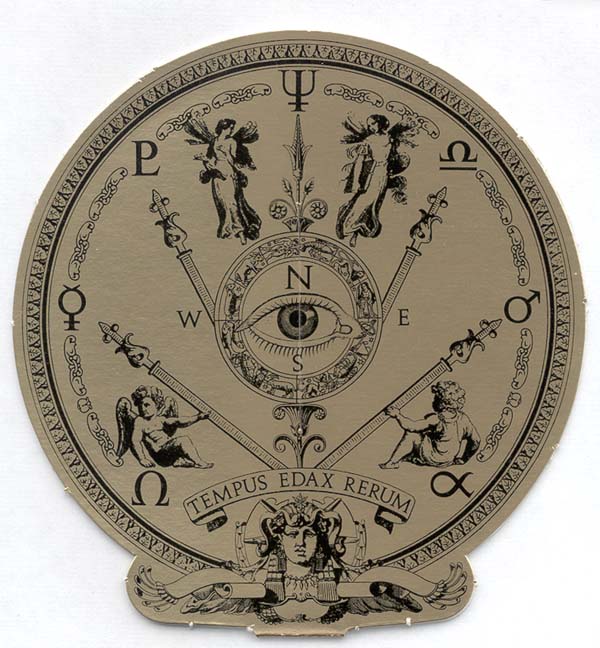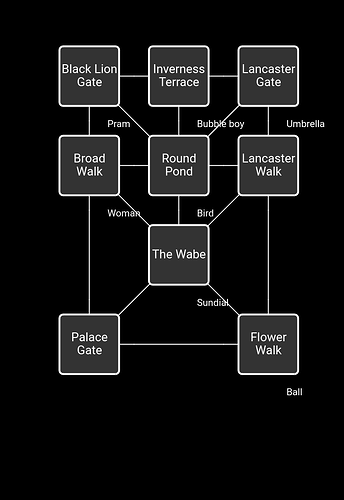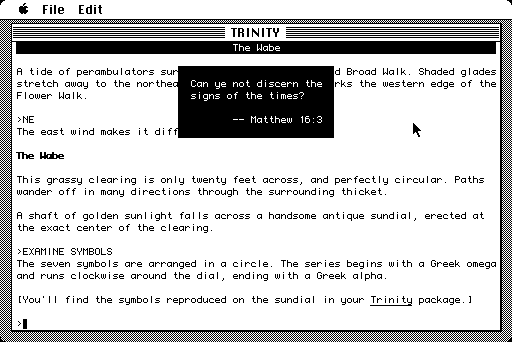While we’re in the Wabe, I think it’s important to apply the rules of adventuring.
>x gnomon
It’s a triangular piece of metal, about a quarter-inch thick and four inches long, screwed into the center of the sundial.
First, anything not nailed down is mine.
>take gnomon
The gnomon on the dial wobbles loosely when you try to move it.
Second, anything I can pry loose is not nailed down.
>turn gnomon
You can feel the gnomon getting more and more wobbly as you turn it. A final twist, and it falls with a clatter onto the face of the sundial.
And since this is an old-school game, we have to do one more TAKE.
>get gnomon
You take the gnomon off the sundial.
[Your score just went up by 5 points. The total is now 5 out of 100.]
[NOTE: You can turn score notification on or off at any time with the NOTIFY command.]
Turning off score notification was another attempt to make things a bit more literary. But I’m leaving it on because I want to see when we do something right!
After a bit of exploration, this is the overall map of our current area.
I’m going to be going around it counter-clockwise. Which means, after the Palace Gate, we’re headed to the Flower Walk!
Flower Walk
Gaily colored flower beds line the walks bending north and west, filling the air with a gentle fragrance. A little path leads northwest, between the trees.
You can see a soccer ball half-hidden among the blossoms.
The spires of the Albert Memorial are all too visible to the south. Passing tourists hoot with laughter at the dreadful sight; nannies hide their faces and roll quickly away.
Not nailed down? Mine.
>get ball
You take the soccer ball off the flower beds.
[Your score just went up by 1 point. The total is now 6 out of 100.]
And what are those spires?
>x spires
Your London guide book warned you that the Albert Memorial was ugly, but nothing could have prepared you for this embarrassing spectacle!
Is it really that bad?

I’ve seen some ugly architecture, and this doesn’t even rate on that scale. (Even leaving aside my family’s hereditary feud with Frank Lloyd Wright.)
As we pass the Round Pond, something new happens:
One of the toy boats on the Round Pond catches your eye. The east wind blows it closer, and you realize that the white sails are actually wings. It’s a folded paper bird, floating just within reach.
>get boat
The toy boats are far out of reach.
>get bird
You lean over the edge of the Round Pond, and pluck the paper bird out of the water.
[Your score just went up by 3 points. The total is now 9 out of 100.]
Mine!
Back to exploring.
Lancaster Walk
An impressive sculpture of a horse and rider dominates this bustling intersection. The Walk continues north and south; lesser paths curve off in many directions.
A broad field of grass, meticulously manicured, extends to the east. Beyond it you can see the Long Water glittering between the trees.
A printed notice is stuck into the grass.
>x notice
The words Do Not Walk On The Grass are sternly printed on the notice.
As a tourist, particularly an American one, I think we’re exempt from local rules.
>e
As your feet touch the grass you sense a strange motion around you. Looking down, you watch with horror as the grass begins to ripple and writhe with vegetable indignance!
Angry green stalks whip around your legs, pull you to the ground and drag you, kicking and screaming, back to the paved surface of the Lancaster Walk.
A chorus of offended little voices subsides as you regain your footing.
…
…hm.
Any Brits in the audience, can you confirm that this is how English grass behaves?
>x water
You can see it sparkling between the trees to the east.
A young couple zooms down the Lancaster Walk on bicycles. You watch them roll across the grass and disappear into the crowd.
Aha, it says Do Not Walk On The Grass, not Do Not Go On The Grass. I suspect we need to find a bike. (Then again, it’s the Lancaster Walk, not the Lancaster Bike…)
>x sculpture
According to a plaque, the sculpture is called Physical Energy.
I wouldn’t have expected this sculpture to have its own Wikipedia page, but here we are.

A shame we didn’t bring our camera. We could take our picture in front of it!
Continuing on around.
Lancaster Gate
A crooked old tree shades the perambulators as they roll south down the Lancaster Walk. Shady paths lead west along an iron fence, and southwest between the trees.
There’s an old woman under the tree, struggling to open an umbrella. The stiff east wind isn’t making it easy for her.
>x woman
Her face is wrong.
You look a little closer and shudder to yourself. The entire left side of her head is scarred with deep red lesions, twisting her oriental features into a hideous mask. She must have been in an accident or something.
A strong gust of wind snatches the umbrella out of the old woman’s hands and sweeps it into the branches of the tree.
The woman circles the tree a few times, gazing helplessly upward. That umbrella obviously means a lot to her, for a wistful tear is running down her cheek. But nobody except you seems to notice her loss.
After a few moments, the old woman dries her eyes, gives the tree a vicious little kick and shuffles away down the Lancaster Walk.
Now there’s an evocative description, “oriental” notwithstanding. Given what I know about the game’s themes, and that this is an elderly Asian woman in the 1980s, I’m going to guess these are radiation burns from Hiroshima or Nagasaki. (I’m not going to embed that image here; click the link at your own discretion.)
>x umbrella
The closed umbrella dangles in the tree overhead, high out of reach. Its handle is carved in the shape of a parrot’s head.
>x tree
It’s quite a nice tree, actually, except for the umbrella wedged in its branches.
That poor woman…maybe we can solve a puzzle and get her her umbrella back. Also, given the description and the faintly whimsical tone of the animate grass, this seems to be the umbrella from Mary Poppins.
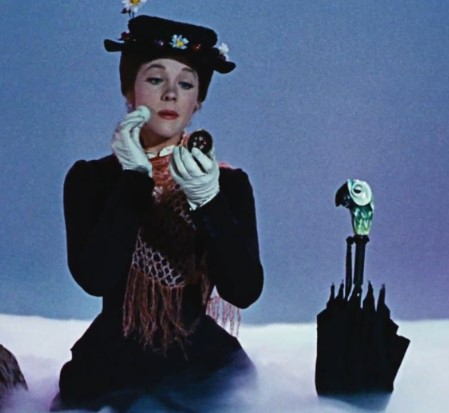
Moving on!
Inverness Terrace
Crowded walkways lead east and west along an iron fence. Narrow paths wander south into the Gardens.
A young boy sits nearby, listening to a pair of headphones and idly blowing soap bubbles. There’s a dish full of soapy water by his side.
The boy dips the bubble wand in the dish and swishes it around.
Examining the boy gets us a quote but no further detail.
Black Lion Gate
Nannies and tourists hurry through the Lancaster Gate to join the perambulators rolling south down the Broad Walk. Less crowded paths wind east along an iron fence, and southeast between the trees.
A careless nanny has left her perambulator unattended.
…did someone abandon a baby? (“Perambulator” is the long version of “pram”, those things nannies push babies around in.)
(Also, apparently there were motorized ones in the 20s? TIL.)
>x pram
It looks as if the perambulator is closed.
Okay, but is there a baby inside?
>open it
You open the perambulator.
Okay, but is there a baby inside?
>x it
It looks as if the perambulator is open.
Okay, but is there a baby inside?
>search it
You see nothing unusual inside the perambulator.
This still doesn’t answer my question! A baby is the most usual thing to find inside a perambulator!
I’m just going to assume there’s not.
We can’t take the pram, but we can push it from room to room, which is definitely part of a puzzle somewhere. And now we’re back at Broad Walk.
Before stopping for tonight, let’s take a look at that paper bird.
>i
You’re holding a paper bird, a soccer ball and a gnomon. You’re wearing a wristwatch, and you have a credit card and a seven-sided coin in your pocket.
Oh! So X ME doesn’t actually show all our possessions, only the ones we’re wearing!
>x card
You’ll have to take it out of your pocket first.
Game…
>get card then x it
You take the credit card out of your pocket.
[There aren’t any verbs in that sentence.]
Game…
>x card
The credit card is embossed with the usual codes. It expires tomorrow.
That’s an oddly specific detail. Why tomorrow? Back in the 80s, did people get temporary cards to take on vacation, that would expire as soon as the vacation did (in case they got lost or stolen)?
>x coin
You’ll have to take it out of your pocket first.
GAME…
>get coin then examine it
You take the seven-sided coin out of your pocket.
“Feed the hungry birds!”
It’s standard British currency, worth fifty pence.
Nice classic 50p coin.
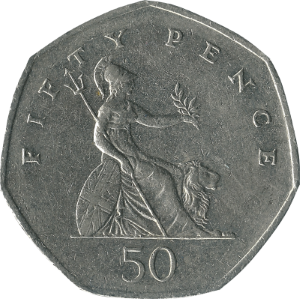
Which is enough to buy some crumbs!
At least in 1986. Nowadays inflation might have outpaced that.
>buy crumbs
[with the seven-sided coin]
“Bless yer,” coos the bird woman, taking your money with a practiced snatch. “Twenty p’s the change.” She holds out a bag of crumbs and a small coin for you.
[Your score just went up by 1 point. The total is now 10 out of 100.]
“Take yer bag and change, guv’ner!”
>get bag and coin
The bag of crumbs: Taken.
The small coin: Taken.
In hindsight I probably should have tried the card first to see if there was a special response. Also, for the Brits here: does “guv’ner” establish that the player character is male? Or could a woman also be addressed like that?
Anyway, what were we doing? Oh right, that paper bird!
>x bird
The paper bird is skillfully folded from a piece of paper. Something is written between the folds.
>read bird
You’d have to unfold the paper bird to do that.
>unfold bird
You gently unfold the paper bird to its full size.
>read paper
The words “Long Water, Four O’Clock” are scrawled on the piece of paper.
>x watch
Your wristwatch says it’s 3:43:45 pm.
A bit of experimentation reveals that 15 seconds pass per turn. The Long Water is across that grass we can’t cross, so I’m guessing we need to finish everything in this area and solve that puzzle before 4:00, when Plot Happens.
Given how many turns I’ve wasted experimenting, I’ll almost certainly have to restart to make it in time. But for now, here’s the first session’s save and transcript.
01.sav (1.0 KB)
01.txt (13.5 KB)
What next? Personally, I want to try to throw the soccer ball at the tree and knock the umbrella down, but the strong wind might make it impossible to aim well enough.
